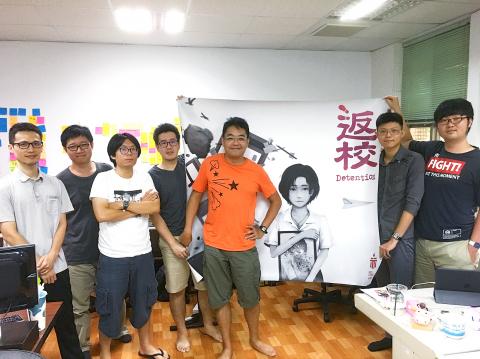White Terror era-inspired, Taiwanese-made survival horror video game Detention has achieved best-seller status for the Taiwan region on Steam — an online gaming platform — and received plaudits from critics.
According to Red Candle Games — the game’s Taiwanese developer — Detention is a side-scrolling adventure that takes place in Taiwan during the 1960s, when the nation was in the midst of the White Terror era and under martial law.
The game was released on Steam on Thursday last week, Red Candle said.

Photo: Wu Po-wei, Taipei Times
The White Terror era refers to the suppression of political dissidents following the 228 Incident, an uprising that began on Feb. 27, 1947, which was brutally suppressed by the then-Chinese Nationalist Pary (KMT) regime. The government subsequently imposed martial law, which was lifted on July 15, 1987.
The game’s creator, Yao Shun-ting (姚舜庭), said that the fear of religious or political persecution during that period was used as a subtext to the gameplay.
The game incorporates aspects of Taiwanese and East Asian culture and drew inspiration from Taiwanese history, as well as religious themes from Taoism and Buddhism, the developers said.
Centered on a male and a female student at a haunted junior-high school in a remote mountainous region, players explore the history of their environment to help them deal with supernatural dangers, the developers said.
Reviewers praised the game, saying it effectively combined classic survival horror gameplay and Taiwanese culture, such as religious practices, funeral rituals and historical events.
YouTube games critic Chang Chia-hang (張嘉航) purchased the game and broadcast gameplay three days after its release on Steam and said he was stunned into silence by his playing experience.
Several foreign gaming critics have also praised the game.

Taiwanese were praised for their composure after a video filmed by Taiwanese tourists capturing the moment a magnitude 7.5 earthquake struck Japan’s Aomori Prefecture went viral on social media. The video shows a hotel room shaking violently amid Monday’s quake, with objects falling to the ground. Two Taiwanese began filming with their mobile phones, while two others held the sides of a TV to prevent it from falling. When the shaking stopped, the pair calmly took down the TV and laid it flat on a tatami mat, the video shows. The video also captured the group talking about the safety of their companions bathing

US climber Alex Honnold is to attempt to scale Taipei 101 without a rope and harness in a live Netflix special on Jan. 24, the streaming platform announced on Wednesday. Accounting for the time difference, the two-hour broadcast of Honnold’s climb, called Skyscraper Live, is to air on Jan. 23 in the US, Netflix said in a statement. Honnold, 40, was the first person ever to free solo climb the 900m El Capitan rock formation in Yosemite National Park — a feat that was recorded and later made into the 2018 documentary film Free Solo. Netflix previewed Skyscraper Live in October, after videos

Starting on Jan. 1, YouBike riders must have insurance to use the service, and a six-month trial of NT$5 coupons under certain conditions would be implemented to balance bike shortages, a joint statement from transportation departments across Taipei, New Taipei City and Taoyuan announced yesterday. The rental bike system operator said that coupons would be offered to riders to rent bikes from full stations, for riders who take out an electric-assisted bike from a full station, and for riders who return a bike to an empty station. All riders with YouBike accounts are automatically eligible for the program, and each membership account

A classified Pentagon-produced, multiyear assessment — the Overmatch brief — highlighted unreported Chinese capabilities to destroy US military assets and identified US supply chain choke points, painting a disturbing picture of waning US military might, a New York Times editorial published on Monday said. US Secretary of Defense Pete Hegseth’s comments in November last year that “we lose every time” in Pentagon-conducted war games pitting the US against China further highlighted the uncertainty about the US’ capability to intervene in the event of a Chinese invasion of Taiwan. “It shows the Pentagon’s overreliance on expensive, vulnerable weapons as adversaries field cheap, technologically